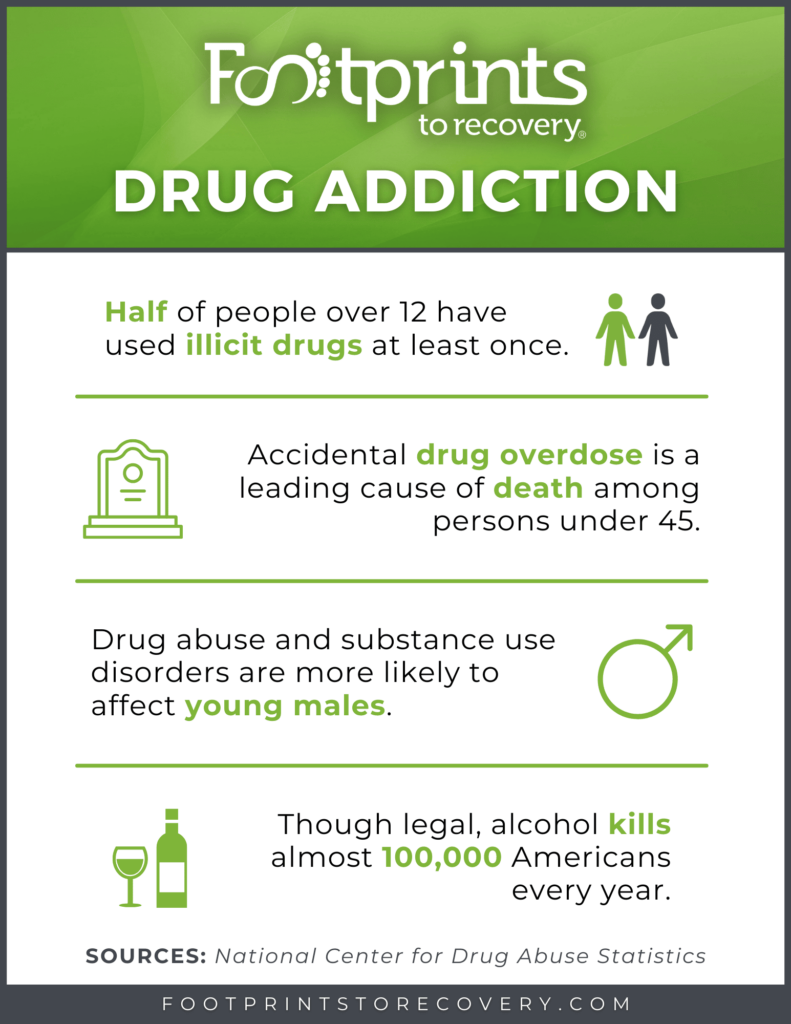You fill the shot glass with liquor, and you hold it up to your lips for the 20th time today. You feel sick without that drink, and even though you don’t really want it, you know you must drink it. Is your addiction physical or psychological? Experts would say it’s both.
An addiction (whether it’s to alcohol or something else altogether) stems from brain cell alteration. Each drug dose you take alters portions of your mind responsible for memory, reward, and decision-making. All of those tiny changes add up, and when they do, it grows harder and harder to make good choices about drug use.
At the same time, you build up habits that support drug use. You find new friends, you start using drug lingo, and you buy paraphernalia to support your use. Those changes make quitting harder too. The more you know about how addictions work and how they are treated, the more effective your healing plan will be. In this guide, we’ll cover:
- Drugs linked to addiction and dependence.
- How addictions develop.
- What addictions look like.
- Risks associated with addiction.
- Statistics relating to addiction.
- How you can help someone in need.

What Drugs Are Associated With Addiction?
Think of addiction as a process. A predictable set of steps leads to brain cell changes and compulsive use. One of those steps involves physical dependence.
Drugs cause a massive release of brain chemicals, and that flood can burn out receptors and lower receptivity. The result: You need to take more of the drug to feel the same high. Keep going, and you’ll need the drug to stave off withdrawal and sickness.
This is physical dependence, and as the National Institute on Drug Abuse (NIDA) points out, it’s not the same as addiction. Someone can be dependent on a prescription medication taken on a doctor’s orders without ever feeling compulsively drawn to take it. But dependence often goes hand in hand with addiction. When we’re talking about drugs with a high addiction risk, we’re typically mentioning substances that spark dependence. They include:
- Alcohol. Shaking hands, sweating, and hallucinations hit heavy drinkers when they try to quit.
- Opioids. Flu-like symptoms and heavy cravings strike within a few hours of the last hit.
- Cocaine. Severe depression and intense cravings follow a long binge.
- Marijuana. New research from NIDA suggests heavy users develop irritability, insomnia, and cravings when they try to quit.
Some substances aren’t closely linked to dependence. Hallucinogens, including psilocybin mushrooms, and some designer drugs like bath salts haven’t been conclusively linked to this issue.
Even so, some people can become enchanted by these substances, and they can take them repeatedly. Some also claim that they can’t stop taking them, even though they want to.
More on Addiction
How Does Addiction Start?
Every person who develops an addiction has a unique story to tell. The majority begin with the decision to use substances just one time.
We use addictive substances to feel good, to ease awkward situations, or as a way to bow to peer pressure. Sometimes, we use substances due to curiosity. We wonder if they’re as strong and powerful as everyone mentions.
So we take one hit. Then, we take another. In time, those use episodes come closer and closer together. Soon, we can’t stop using when we want to.
The speed of this process varies dramatically from person to person, but it might surprise you to learn how long some people abuse substances before they do finally quit.
In a study published in the Journal of Substance Abuse Treatment, researchers found that people took drugs for an average of 27 years before they stopped for good.
Other studies have examined the speed at which addictions developed. They found close ties between quick transitions and:
- Race
- Gender
- Childhood abuse
- Personality disorders
- Abuse of multiple substances
Examine this list closely. You’ll see some elements related to genetics and other factors we can’t control. You’ll see some that stem from the environment and the way we’re raised. And still others were personal choices.Clearly, nature and nurture intertwine in the development of an addiction.
Clearly, nature and nurture intertwine in the development of an addiction.
Genes can dictate how our bodies respond to drugs, but the way we’re raised can prime us to start abuse, and our lifestyle could be a barrier to sobriety.
What Drugs Are Associated With Addiction?
There are no lab tests to detect addiction. But families know one another well, and they are often the first to identify an issue. Families that are alert and aware of what to watch for can be on the frontlines of fighting back.
Symptoms may vary, depending on the drug the person uses. But in general, addiction can cause:
- Physical changes. Weight loss, insomnia, needle marks, frequent vomiting, complaints of pain, and shaking have all been associated with drug abuse.
- Behavioral alterations. Rapid mood shifts, paranoia, social withdrawal, and an enhanced need for privacy could all point to drug use.
- Paraphernalia hoarding. Most drugs need equipment for ingestion. Needles, candles, matches, tourniquets, shot glasses, or flasks could all be part of a drug-taking kit.
People with addictions may hope to hide the issue from the people they love. They may use slang terms to talk about their substances, so they won’t cause undue worry.
People with addictions may hope to hide the issue from the people they love. They may use slang terms to talk about their substances, so they won’t cause undue worry.
Below are terms associated with certain drugs of abuse.
- Opioids: Bananas, Bupes, Oranges, Subs, Dragon’s Breath, Fenty, Fire
- Heroin: Ballot, Beast, Brown Crystal, Brea Negra, Black Tar, A-Bomb
- Cocaine: Death Valley, Belushi, Mosquitos, Paloma, Snow White, Snowball, Queso Blanco
- Benzodiazepines: Benzos, Tranks, Super Valium
- Marijuana: Green Paint, Grass, Alfalfa, Camera, Endo, Gold Leaf
There are hundreds more slang terms for drugs, as this 125-page report from the Drug Enforcement Administration makes clear, and new terms come into the lexicon all the time. In general, garbled speech like this should be cause for concern. If family members can’t talk openly, someone is hiding something.

What Risks Come With Addiction?
It’s hard to overstate just how dangerous drugs can be. From the moment you start until after you’ve stopped, you could feel the consequences of almost every hit you put inside your body.
Experts say the consequences of drug use can be sheared into three categories:
Immediate – Some drugs can overwhelm the body’s critical systems. When that happens, you can lose your life to drug use. According to NIDA, more than 70,000 people died due to drug overdoses in 2017 alone
Short -Term – Ongoing drug use can cause you to lose your job, and it can strain your relationships too. Some types of drugs can spark skin, nasal, or digestive tract infections. And others are associated with risk-taking that could lead to pregnancy or STDs.
Long-Term – Sometimes, drugs leave scars that just won’t heal. For example, the Centers for Disease Control and Prevention says people who use needles with drugs can develop hepatitis C quite easily. The virus can stick to syringes, cooktops, fingers, and surfaces. Some forms of hep C can’t be cured. Drug use can also cause the collapse of nasal tissues, scarring of the heart muscle, and much more.
Some drugs can overwhelm the body’s critical systems. When that happens, you can lose your life to drug use. According to NIDA, more than 70,000 people died due to drug overdoses in 2017 alone.
How Common Is Addiction?
If your family is touched by addiction, you’re certainly not alone. Researchers have gathered up data about people who use drugs, including numbers relating to how many get help. That research proves that addictions and recovery are common.
Here’s a snapshot of what we know about:
- Addiction prevalence. In 2015, the Substance Abuse and Mental Health Services Administration (SAMHSA) says that 21.7 million people needed drug abuse treatment.
- Treatment need. Of those who required treatment in 2015, SAMHSA says just 10 percent got help in a specialty facility.
- Recovery prevalence. Of all American adults, 10 percent report being in recovery, says the Partnership for Drug-Free Kids.
- The opioid crisis. Every day, more than 130 people lose their lives due to opioid overdoses, says NIDA. Prescription painkillers like Vicodin started the problem, but the newest wave of deaths is associated with illicit fentanyl.
How You Can Help Someone With an Addiction
Reading about addiction is scary. Citing statistics isn’t easy either. But there is hope. If someone you love has an addiction, there is a lot you can do to be a source of inspiration and hope.
You could:
- Talk informally. Open up the conversation over morning coffee. Talk about what you’ve seen. Ask if the person would be willing to talk with a treatment team if you’re there and you can help.
- Hold an intervention. You’ve had informal talks, and they didn’t go anywhere. What should happen next? An interventionist could help you have a formal discussion that could move the issue forward when your efforts fail.
- Research treatment. People who don’t know what an addiction is often have no idea about what treatment looks like and how it might work. Perhaps your information could help give them hope.
The goal of your conversation is to encourage the person to enter a treatment program. But you must also remember to take care of yourself.
Even if the person never chooses to change, you can choose to care for yourself. You can choose to eat right, get enough sleep, and see your friends. The kinder you are to yourself, the more you will have to give to others.
Don’t let addictions rule your life. Reach out and help the person you love, and you just might end up helping yourself.Drug Categories
- Alcohol
- Psychoactives
- Narcotics
- Stimulants
- Depressants
- CNS Depressants
- Hallucinogens
- Plant Herbal Based
- Synthetics
- Research Chemicals
- Designer Drugs
- Club Drugs
- Inhalants
- Over-the-Counter
- Opioids
- Partial Opioid Agonist
Self-Assessment: Am I Addicted?
" *" indicates required fields
Questions about treatment options?
Our admissions team is available 24/7 to listen to your story and help you get started with the next steps.

